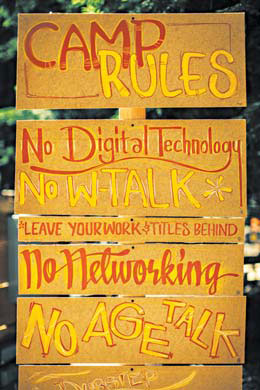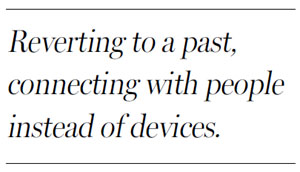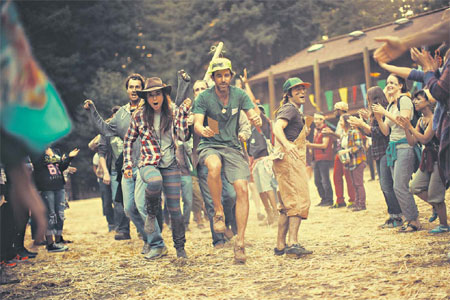A gadget-free getaway
Updated: 2013-08-26 11:17
(China Daily/Agencies)
|
||||||||
|
Photographs by Scott Sporleder |



To break a tech addiction, a camp with simpler diversions
There was a phantom buzzing in my shorts pocket, where I always kept my iPhone. But my phone was stapled inside a grocery bag along with my watch, credit card and identification. Any buzzing I felt was surely imagined.
Then again, it could have been a mosquito.
This was Day Two at Camp Grounded, an adults-only summer camp held about two hours north of San Francisco. About 300 people had gathered there for three days of talent shows, flag-raisings and other soothingly regressive activities organized by Digital Detox, a group based in Oakland, California, dedicated to teaching technology-addled (or technology-addicted) people to, in the words of its literature, "disconnect to reconnect."
The rules of Camp Grounded were simple: no phones, computers, tablets or watches; work talk, discussion of people's ages and use of real names were prohibited.
There was a reason such strictures seemed appealing. A year ago, I was an editor at a news blog. My days started at the office at 7:30 a.m., where I routinely worked through lunch until 6:30 p.m. I was compelled to follow 1,200 Twitter users, skim 180 RSS feeds and edit dozens of posts a day. At night, the iPhone was docked beside my bed, making me feel that even as I slept, I was on the banks of the data stream just in case anything important - or anything at all - happened.
After a few months, my hands became numb and I asked my doctor for a chest X-ray because I was convinced I had pneumonia. I was beyond burned out.
At Camp Grounded, however, we would no longer be bloggers, entrepreneurs, lawyers or consultants; we were just ourselves. By removing the things that supposedly "connect" us in this wireless, oversharing age, the founders of Digital Detox hoped to build real connections that run deeper than following one another on Twitter or "liking" someone's photo.
Campers, who, according to organizers, ranged in age from 19 to 67, were invited to share with and learn about one another.
All of which started immediately. We were greeted by counselors bursting with positivity. I had had a long, twisting ride up the mountain to get to the camp, and wasn't prepared for so much enthusiasm, especially not the hugs. What was I getting myself into?
"My goal now is to connect people," Levi Felix, Digital Detox's 28-year-old co-founder, told me. "The only moment that matters is right now."
Mr. Felix is part of an emerging shift toward mindfulness among users of
technology. Rather than merely accept social media's intrusions, some tech-savvy folks are rethinking their attachment to electronic devices.
Groups like Reboot have begun to advocate for digital sabbaths. Jaron Lanier, a pioneer in the field of virtual reality, has begun to speak out against the dehumanizing downsides of technology.
As for Mr. Felix, he used to work at Causecast.com, a corporate philanthropy platform, but after long hours and a bad diet landed him in the hospital, he re-evaluated his priorities. He sold his car and traveled for two and a half years. He spent time in Southeast Asia, letting his facial hair grow like a wizard's.
"I had the opportunity to step away from 'the modern world' for a little bit," Mr. Felix said. "I went on my hero's journey and I escaped. A lot of people who do that never come back. They live vagabond lives. I came back, and my cause was to show people how to connect, how to shed these rules and unwritten codes we bought into."
He founded Digital Detox last year. Camp Grounded was designed less to be a spiritual journey than a whimsical return to childhood. Campers, who spent $300 for the weekend, were sent maps, instructions and a suggested packing list of clothes.
Men and women were separated and bunked in three-walled cabins. The rifle range had been reconceived as a typewriter range, and a yurt had been erected near a stream and used as an all-night tea lounge. There was skinny-dipping at the swimming hole. An old bus parked in a clearing hosted a late-night concert.
Meals were vegan variations on summer camp staples: One night it was gluten-free "mac 'n' cheese." To hear some of the campers tell it, giving up meat was harder than giving up technology. For the most part, though, complaints were few and conflicts nonexistent. As for love, any fears (or fantasies) that this would happen went unrealized. It seemed everyone reverted to a preadolescent state of innocent crushes and hand-holding.
One night, I found myself lying on my back, gazing up at the night sky. The only other times I'd seen the constellations so clearly were when I glanced up at the ceiling in Grand Central Terminal in New York City.
Somewhere outside of Camp Grounded, iPhones were buzzing with the breaking news of Rupert Murdoch's divorce and Kim Kardashian's baby.
But I was looking for shooting stars, not reality ones. And for once, I was enjoying the silence.
The New York Times

 'Despicable' minions upset Depp's 'Lone Ranger' at box office
'Despicable' minions upset Depp's 'Lone Ranger' at box office
 'Taken 2' grabs movie box office crown
'Taken 2' grabs movie box office crown
 Rihanna's 'Diamonds' tops UK pop chart
Rihanna's 'Diamonds' tops UK pop chart
 Fans get look at vintage Rolling Stones
Fans get look at vintage Rolling Stones
 Celebrities attend Power of Women event
Celebrities attend Power of Women event
 Ang Lee breaks 'every rule' to make unlikely new Life of Pi film
Ang Lee breaks 'every rule' to make unlikely new Life of Pi film
 Rihanna almost thrown out of nightclub
Rihanna almost thrown out of nightclub
 'Dark Knight' wins weekend box office
'Dark Knight' wins weekend box office
Most Viewed
Editor's Picks

|

|

|

|

|

|
Today's Top News
Luxury imports may face fewer big-ticket payoff days
Joint sea drill shows improved relations
UN to probe alleged chemical attack
Bo insists he did not abuse power
Newly born panda cub at Washington zoo doing fine
Market regulators need to fix loopholes
Singapore PM aims to cement relations
Experts call for details on rumor cases
US Weekly

|

|








